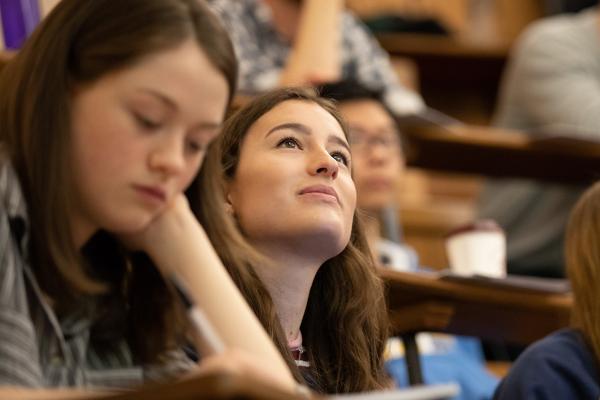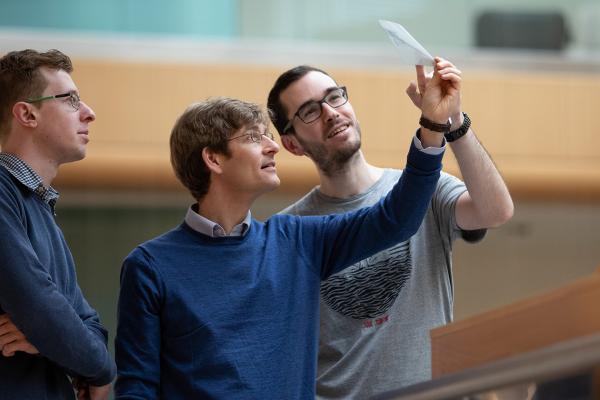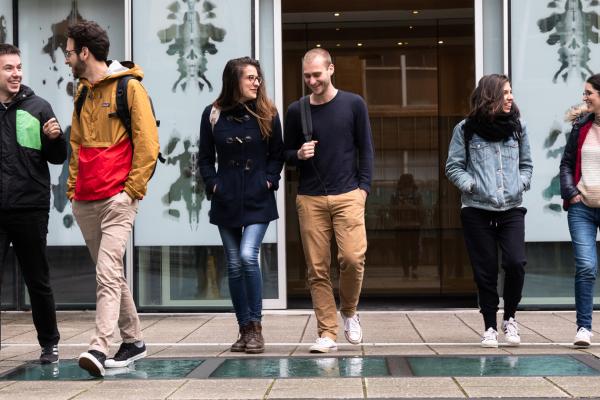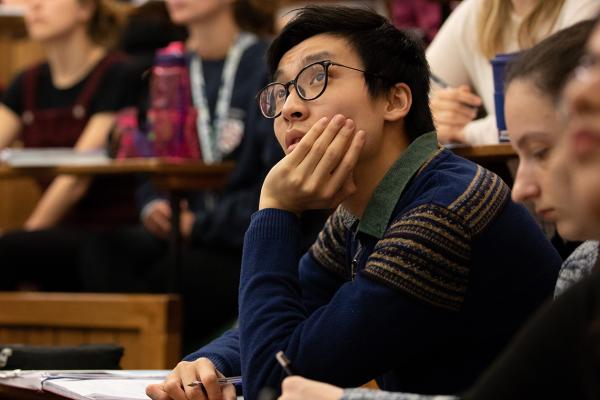Undergraduate admissions
Biochemistry isn’t taught at A-level, so you won’t be expected to have detailed knowledge of the subject. However an A-level in Chemistry (or an international equivalent) is essential and well as strong grades in related areas like maths, or biology.
What we’re looking for
It is essential to have A-level in Chemistry, or the equivalent (see the University international qualifications page – if you are doing a qualification not listed and want to see whether your qualification covers the same material as A-level chemistry, the following are links to the AQA, edexcel and OCR A-level chemistry syllabuses).
The course has significant maths and biology content, and some physics. The first-year course provides the necessary background in biology, physics and mathematics for those who have not studied these subjects beyond GCSE. However Maths to A-level or the equivalent is very helpful to students in completing the course and, although not required for admission, will make an application more competitive. Biology beyond GCSE or the equivalent can be helpful to students in completing the course, although not required for admission.
The course also involves a very significant essay writing component, and so applicants should be able to demonstrate on their UCAS form, and during the interview process, an acceptable standard of English.
Typical conditional offers
Although any offers we make are decided by college tutors on an individual basis, the recommended typical offers are:
A*AA, including chemistry and another science or maths, and with the A* in maths, physics, chemistry, or biology (or a very closely related subject).
Biochemistry tutors do not necessarily require three A-levels (or the equivalent) to be sat together at the end of year 13. If a candidate has completed one or more A-levels in year 12 which are relevant to the biochemistry course (maths, physics, chemistry, biology or a closely related subject) then this may contribute to meeting an offer (e.g. achieving a grade A in year 12 may result in an offer that would have been A*AA becoming an offer of A*A). As with all offers, the specific offer received by a candidate who has completed one or more A-levels in year 12, and how far these A-levels count towards satisfying the typical requirements, is decided on an individual basis.
39 points overall, including Core Points, with 7 in HL chemistry and 6 in two other relevant subjects.
AAB at AH, including an A in chemistry and an A or B in another science or maths, or for those doing two AHs and one H, AAA, including A in AH chemistry and A in another science or maths at AH or H level.
Four APs at grade 5 including chemistry and two other relevant subjects
OR
Three APs at grade 5 including chemistry and two other relevant subjects plus a score of either 32 or above in the ACT or 1470 or above (out of 1600) in the SAT.
You also need to have an acceptable level of English, so if this isn’t your first language any offer will include meeting the University’s English language requirements.
Shortlisting for interview
We usually shortlist for interview roughly three applicants for every available place.
Shortlisting decisions are based on:
- your GCSE grades (or equivalent) along with any AS grades/marks that are available;
- your predicted or achieved A-level grades/International Bacc. Scores (or equivalent);
- your referees report;
- evidence of interest in and academic potential for Biochemistry from your personal statement.
All these are considered in the light of any contextual data (where available) that could have affected your past or current academic performance.
You are unlikely to be shortlisted if your application gives good cause to doubt that you will meet the typical offer, or if your personal statement indicates that biochemistry is not your preferred course of study. Further reasons for not being shortlisted include more than one of: uncompetitive results in official examinations, especially GCSE or its equivalent; uncompetitive predicted/obtained results in A-level or equivalent examinations; or an uncompetitive UCAS referee’s statement.
Interviews
All shortlised applicants will be interviewed online by two different Colleges. This interview will take place using Microsoft Teams and potentially make use of the whiteboard software Miro. Interviews are used to discover your potential, taking into account your background and the stage you have reached, rather than to grill you on what you have covered so far at school. The interviewers will be looking at your interest in and enthusiasm for biochemistry, your ability to discuss and analyse relevant topics (often involving ideas or information that may be new to you), and your general reasoning and problem-solving skills.
Items specifically assessed at interview are:
- your Interest in/enthusiasm for biochemistry;
- your ability to describe/discuss a topic of mutual interest;
- your ability to describe/analyse, and extrapolate from, novel information;
- your reasoning and problem solving ability.
The current University interview timetable along with details of the technical requirements for interview (and support available) can be found on the University’s admissions site.
Final decisions
Final selection decisions are based on all the information that is available about an applicant and not just the interview performance (which is frequently not decisive).
How to apply
The University’s undergraduate admissions podcast series provides further information on the admissions process as well as what it’s like to live and study in Oxford.
Your school will have most of the information you need, as you’ll just apply in the normal way through UCAS. If you want more details of some of the parts of the application process that are specific to the University of Oxford, you can take a look at the undergraduate admissions pages.
The details you’ll need for your application are:
Course name: Biochemistry (Molecular and Cellular)
UCAS course code: C700
UCAS institution code: O33
We’re more than happy for you to apply for a deferred entry. You will be treated no differently from immediate entry applicants, and the offer you receive will be no more demanding. It is possible that, with discussion with the applicant, a deferred entry applicant may be offered an immediate place instead, or vice versa.
All applications must be made through UCAS in the normal way. Biochemistry tutors do not accept applications that are outside the normal, single gathered field.
The Biochemistry Department does not accept students who wish to transfer to Oxford from any other university and start part way through the undergraduate course. If you’re currently studying at another university and want to study here instead, you’re welcome to apply through UCAS in the usual way. So even if you’ve partially completed a biochemistry programme elsewhere, you would have to start your study with us at the beginning of the first year.
However it is possible to apply directly to colleges as a visiting undergraduate student. Doing so will allow visitors can follow part of the undergraduate course, usually for one to three terms. This doesn’t result in an Oxford qualification.
Other admissions policies and processes
A College may request that some of their first preference candidates be reallocated (changing their first preference College) if their total number of first preference interviews is significantly greater than the number of first + second preference interviews conducted by the other Colleges.
Reallocation of candidates will take place after decisions on shortlisting for interviews. Reallocated candidates will be called for interview.
The reallocation process will be as follows:
- Any Colleges wishing to reallocate some of its applicants should contact the Admissions Coordinator (AC) informing them of how many applicants they wish to reallocate.
- Any Colleges wishing to receive reallocated applicants should contact the AC informing them of how many applicants they wish to receive.
- By informing the AC that they wish to take part in the reallocation scheme, each College is agreeing to abide by all the rules of the scheme, detailed as follows.
- If the number of places available at Colleges wishing to receive applicants is larger than the number of applicants to be reallocated, then preference will be given to those Colleges with the weakest applicant list (determined by the Departmental grading of the UCAS applications).
- Each reallocating College may “reserve” (prevent from being reallocated) up to two applicants per place available at that College for the next academic year (excluding open offer places).
- The applicants to be reallocated will be selected at random from all the remaining applicants to each reallocating College by the AC.
- The applicants to be reallocated will be allocated at random to the receiving Colleges by the AC.
- The reallocating Colleges will contact the applicants to inform them that they are being transferred to a different College.
Open offers are offers made to candidates where a place at Oxford University and a College is guaranteed should they fulfil the conditions of the offer. However, the specific College is decided in August once the examination results for all candidates are available and it is known which Colleges have vacancies.
The number of open offer places needed each year is decided by the Department and Colleges, assuming enough individual Colleges are prepared to underwrite places. Colleges which offer to underwrite a place but are not asked to do so by the Department are treated entirely equivalently to the other underwriting Colleges.
Each pool candidate is underwritten by one College. In the event that the candidate cannot be placed elsewhere, that College guarantees to take the candidate even if they have no vacancies.
The minimum offer for an open offer candidate is the departmentally recommended offer.
No College can accept a candidate who has failed their conditional offer until all the open offer candidates who have met their offers have been placed.
The order of priority for Colleges wishing to take a pool candidate is:
- The underwriting College, if it has an unfilled place;
- Any other underwriting College, if it has an unfilled place;
- Any other College, if it has an unfilled place;
- The underwriting College, as an additional place;
- Any other College, as an additional place.
If no College wants to take a pool candidate who has met their conditional offer, then the order of priority is:
- They must be offered a place by any underwriting College, if it has an unfilled place;
- They must be offered a place by the College that underwrote their offer.
We will accept all four IB maths courses, however we would recommend that applicants should do Analysis and approaches HL or SL or Applications and interpretation HL as these will be better preparation for our course and may give the applicant a competitive advantage at admissions.
Most BTEC and access to science courses do not meet the criterion of "A-level in Chemistry, or the equivalent" because these courses do not have a similar breadth and depth (in particular, the same depth on the theoretical side) of chemistry as an A-level course. It is therefore highly unlikely that an applicant who does not have some other means of meeting this criterion will be able to make a competitive application unless there are very significant mitigating circumstances.
We do not accept applications for Senior Student status. All students must start the course at the beginning of the first year. Any applicant who states on their UCAS application that they wish to be considered for Senior Student status will be considered for normal entry in exactly the same way as all other applicants.








